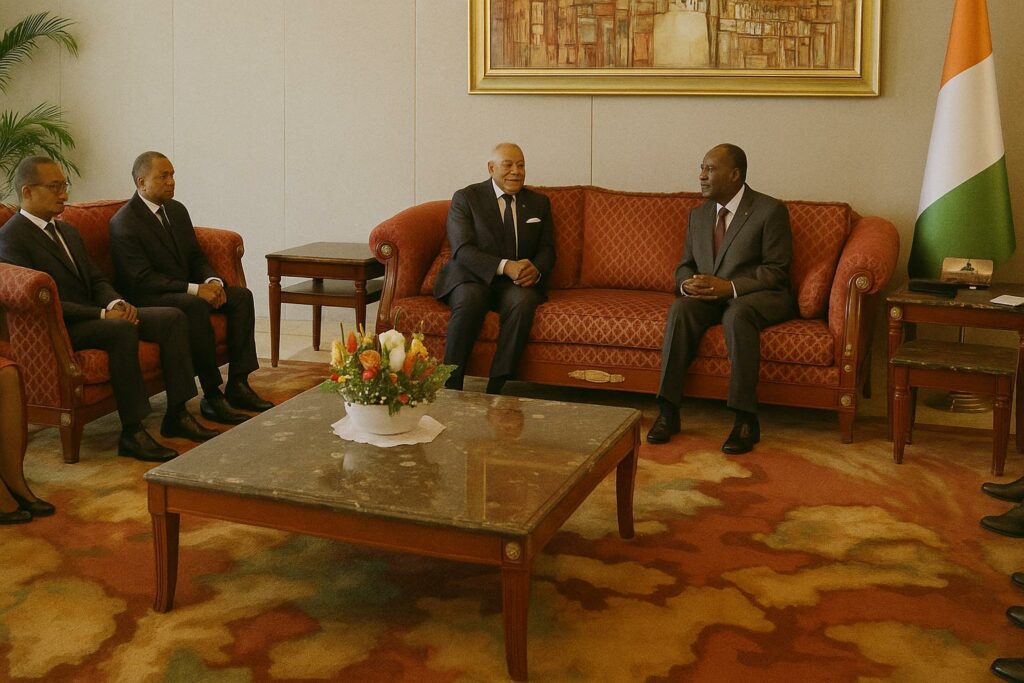Historic affinities recalibrated for contemporary stakes
At first glance the memorandum of understanding signed on 2 July in Abidjan between the National Assemblies of Congo-Brazzaville and Côte d’Ivoire appears as a conventional inter-parliamentary protocol. Yet, diplomats on both shores of the Gulf of Guinea immediately sensed a broader, almost inter-generational resonance. Speaker Isidore Mvouba, entrusted with a personal missive from President Denis Sassou Nguesso, reminded his Ivorian interlocutors that Brazzaville’s current head of state once sought counsel from President Félix Houphouët-Boigny, drafting notes “with a schoolboy’s diligence”, as he colourfully put it in Abidjan. That anecdote, reported by the Congolese daily Les Dépêches de Brazzaville (3 July 2023), was more than nostalgia: it anchored the new document in a lineage of pragmatic cooperation stretching back to the 1970s.
The memorandum’s architecture: from declaratory to operational
While the full text has not been released, aides to Speaker Adama Bictogo in Abidjan emphasised three operative pillars: structured committee-to-committee dialogue, reciprocal staff secondments for legislative drafting, and a joint agenda on conflict-resolution norms aligned with the African Union’s Silencing the Guns initiative (Agence Ivoirienne de Presse, 2 July 2023). Crucially, both assemblies commit to meet at least twice yearly, alternating between the two capitals, thereby normalising a rhythm of consultation often promised but rarely honoured within regional blocs.
Security first: parliamentary diplomacy as a stabilising vector
From the vantage point of Brazzaville, the pact arrives as Central and West Africa confront a shifting security tapestry marked by asymmetric threats and, in some corridors, democratic reversals. By embedding dialogue mechanisms at the legislative tier, Congolese officials argue they are multiplying channels for preventive diplomacy that complement, rather than duplicate, executive-level summits. A senior adviser in the Congolese foreign ministry, speaking on background, framed the memorandum as “a prophylactic instrument” designed to keep disagreements below the threshold of crisis. In Abidjan, Speaker Bictogo adopted a more allegorical tone, stating, “Peace is not edible, yet it renders every meal possible,” a phrase that has since circulated widely on Ivorian social media.
Economic and climate convergences underpinning legislative synergy
Beyond peacebuilding, the document sketches avenues for synchronising oversight of trans-border infrastructure, notably the budding corridor linking Pointe-Noire’s deep-water port to the Ivorian logistics hub of San-Pedro. Parliamentary committees on finance and public works are expected to co-convene before year-end to interrogate funding models that could attract concessional windows at the African Development Bank (Jeune Afrique, 5 July 2023). Parallel to steel and asphalt, the memorandum foregrounds green diplomacy. President Sassou Nguesso’s stewardship of the Congo Basin Climate Commission has earned endorsements from Abidjan, which eyes carbon-credit markets and agro-forestry schemes as buffers against commodity price volatility. Joint legislative hearings are envisaged to reconcile forestry codes and enhance data transparency on emissions, a point echoed by UN Environment Programme observers contacted after the signing.
Soft-power dividends and measured optimism among external partners
Development partners, traditionally attentive to executive signatures, have welcomed the MoU’s parliamentary anchoring. A communiqué from the EU Delegation in Brazzaville lauded what it termed “institutional depth” and signalled readiness to finance technical exchanges on budget scrutiny. In Washington, the Congressional Research Service noted that both assemblies are asserting a form of ‘soft constitutionalism’, enhancing checks without antagonising their respective executives. For Congo-Brazzaville, still navigating post-pandemic fiscal consolidation, such external validation may bolster investor sentiment without necessitating headline-grabbing reforms.
A calibrated step in Brazzaville’s multi-vector foreign policy
Analysts in Libreville and Accra see the memorandum as one tile in Brazzaville’s broader mosaic of multi-vector diplomacy, interlacing Francophone solidarities with an eagerness to remain a constructive broker in continental fora. President Sassou Nguesso’s recent facilitation roles in Libyan and Central African dialogues have reinforced Congo’s profile as a discreet but persistent mediator. The Abidjan agreement offers his administration a low-risk, high-symbolism platform that dovetails with domestic narratives emphasising dialogue and institutional continuity.
Future horizons: metrics of success and plausible constraints
Both sides privately concede that the true test lies not in ceremonial ink but in the conversion of commitments into enacted statutes and joint oversight missions. Parliamentary calendars are notoriously congested, and resource disparities between the two chambers could slow momentum. Nevertheless, veteran observers of Central-West African diplomacy note that even modest, regularised exchanges can generate cumulative trust—an intangible yet indispensable ingredient in a region where mistrust often metastasises into crisis.
Quiet power for turbulent times
Thus, what began as a hand-delivered message of goodwill may evolve into a template for subtler forms of influence: legislative, consultative and resolutely inter-African. Should forthcoming joint sessions deliver tangible frameworks on peacebuilding and climate resilience, Brazzaville and Abidjan will have demonstrated that soft power, exercised through parliaments rather than podiums, retains a potent utility in an era of uncertain geopolitics.

